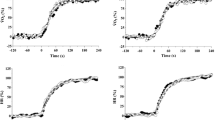Abstract
The present study assessed daily activity, physical capacity and body composition in 11 initially sedentary healthy subjects [5 men and 6 women, mean age 62.8 (SD 2.7) years] before training (To), after completion of 7 (T7w) and 14 (T14w) weeks of training, and again 6 (T6m) and 12 (T12m) months after training. The mean daily activity index decreased from T7w to T12m reaching a lower level than at To [T12m − To = −1.5 (SD 4.6) units, P = 0.18]. Mean maximal oxygen uptake (V˙O2max) and its corresponding mean power output (W˙ max) were increased by 12.5 (SD 6.6)% (P = 0.003) and 22.8 (SD 12.8)% (P = 0.003), respectively, at T14w, and returned to their To levels within 1 year. Mean body mass (m b) remained stable until T6m but increased significantly by 2.6 (SD 3.7)% from T6m to T12m (P < 0.05). Mean fat mass (m f, from bioelectrical impedance analysis measurements) tended to decrease [−2.0 (SD 4.2)%, P = 0.10] during the training period but increased by 7.8 (SD 10.9)% between T6m and T12m (P < 0.05). The mean fat free mass did not vary during the study period (P = 0.81) but magnetic resonance imaging (MRI) showed that mean thigh muscle volume decreased between T7w and T12m to less than at To [T12m − To = −2.3 (SD 3.6)%, P = 0.05]. Therefore, this study confirmed the favourable effects of endurance training on the physical capacity and body composition of elderly people, but demonstrated that the training programme would have to be continued to maintain the training-related benefits (i.e. increased V˙O2max and W˙ max) which would otherwise be lost within 1 year. After training, m b and m f were found to be increased. Furthermore, a fast and reproducible MRI protocol was validated for study of small intra-individual variations in tissue volumes in longitudinal studies.
Similar content being viewed by others
Author information
Authors and Affiliations
Additional information
Accepted: 7 September 1999
Rights and permissions
About this article
Cite this article
Morio, B., Barra, V., Ritz, P. et al. Benefit of endurance training in elderly people over a short period is reversible. Eur J Appl Physiol 81, 329–336 (2000). https://doi.org/10.1007/s004210050051
Issue Date:
DOI: https://doi.org/10.1007/s004210050051




